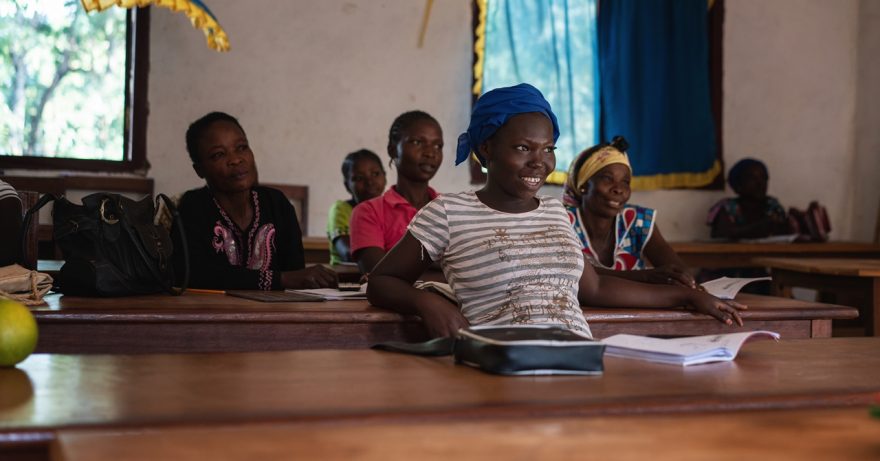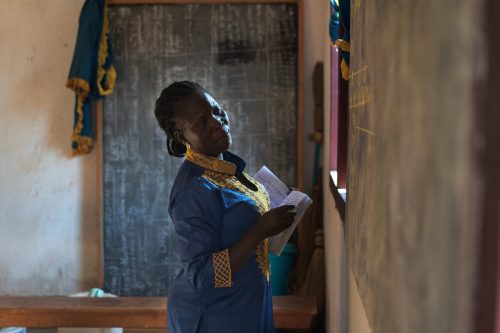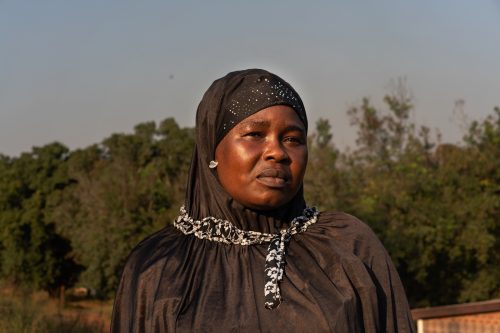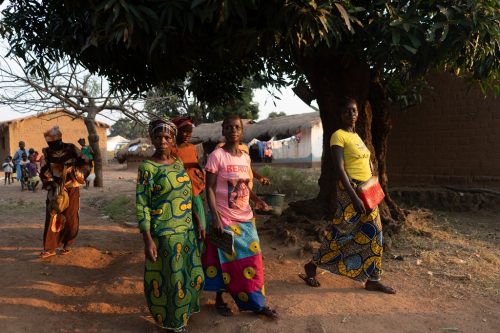”I no longer get conned at the market” – Literacy training boosts sense of self-worth of women in Central African Republic

A woman dressed in an eye-catching blue kaftan is standing in front of the class. A group of women both approaching and past middle age repeats syllables after her in one voice. A wooden plank serving as a pointer taps a determined rhythm on the chalkboard.
The woman is Damaris Sarape, 35, instructor of a literacy group for adult women. On the surface, Damaris is no different from her students. Her everyday life is the same as that of her peers; she lives in one of the two-room clay houses built next to one another, and keeps her children fed by farming.
However, there is one thing that sets her apart, and makes the other women follow her with admiration as well as address her using the respectful Madame. She knows how to read.

Damaris teaches the women in her neighborhood with enthusiasm and determinism.
Being able to read boosts sense of self-worth
Two years ago, when Finn Church Aid asked women living in the remote northwestern parts of the Central African Republic what kind of support they needed in their day-to-day life, among the first things that the women mentioned was wanting to learn how to read.
Based on these wishes, a Women’s Bank project was born, founded on the idea of improving the quality of life of women in the Bozoum region by offering them education in literacy and numeracy, entrepreneurship, and peace work.
”In our community, we have many mothers who don’t know how to read, count, or write. These women deserve better opportunities to be in charge of their own life,” says Damaris, literacy instructor in one of the women’s groups.
Last year, she saw the Women’s Bank’s advertisement for recruiting literacy instructors, applied, and was selected. Damaris is motivated by seeing women she knows gain self-confidence through learning to carry out simple calculations and write their own name.
”If we had been allowed to go to school earlier, we wouldn’t be illiterate now. Before, I didn’t even know how to spell my own name, but now I do. It feels wonderful,” says Nafissa Yaya, 45, mother of six.
The women come from modest circumstances. Many of them had parents who chose to keep their daughters home to do housework, and arranged for them to marry young instead of sending them to school.
However, literacy and numeracy skills are strongly connected to coping with day-to-day life.
”Sometimes I get conned at the market, because I don’t know how to count or how much the change should be. I want to learn how to count in order to better plan my family’s finances and to be able to set aside some savings,” Nafissa continues.
Women and girls are often left outside education. According to an estimate by UNESCO (2010), only 24 percent of women in the Central African Republic know how to read.
Less than half of the adult population in Central African Republic is literate. The number is even lower what comes to women; according to UNESCO (2010), only 24 percent of Central African women can read.
Prolonged conflict and unstable history have resulted in poor levels of education. The influence of the former French colonial administration is still visible today; for example, the official language of instruction in Central African Republic is still French, even though the majority of the population, especially in remote areas, does not master the language. Children do not learn at school if they do not understand what the teacher is talking about.
Women’s Bank’s literacy training is held in sango, which is the primary language spoken in Central African Republic. Studying in sango has sparked enthusiasm and hope among the women about learning still being possible.

Mother of six, Nafissa, hopes that the training will help her find a job.
Hands full with work
Bozoum is a sleepy rural town with about 20,000 inhabitants, where everyday life is simple but filled with work.
When the sun rises above the hills of the town early in the morning, Damaris is already up. She starts the day by sweeping the ground in front of her home, just like the other women in her neighbourhood. It is important to keep one’s own yard looking tidy.
In Central African Republic, women are in charge of taking care of home and children. In the morning, the women walk together to go and work in the fields, and during the day, they sell their crops by the side of the road in order to provide for their families. Many have husbands working in the gold and diamond mines far outside of town. The fathers come home once a month, sometimes once every two months.
Although rich in natural resources, Central African Republic has had a rocky road to travel. The civil war that broke out in 2013 affected Bozoum as well.
Even though the situation is stable at the moment, many are worried about the future.
”There is still unrest in the regions surrounding the town. Only one fifth of those who ran from the war have returned,” says Damaris.
The decreased population has affected the market as well.
”Business is not what it used to be. My family’s subsistence is on the line. I wish I was able to sell more,” says Laole Léocadie, 40, who recently became a widow.
It is not easy to bring food on the table; Laole provides for her six children by working in the fields. The youngest of the children is only two years old.
After her husband was taken away by an illness, the women’s group has become even more important to Laole.
”With the father of my children no longer with us, the other women bring security. It’s easier to have a savings fund and to go and work in the fields together”.
Hope in the middle of adversity
Alice Issoia, 47, has a kind face and a slightly sad smile. When Damaris writes on the chalkboard in sango, she follows attentively. Even Alice recently became a widow.
”My life has been hard since my husband died. I have to take care of our children and finances alone. Sometimes, when my children are fighting and money is tight, I don’t know how I’m going to cope.”
When Alice heard that there was going to be literacy training in her town, she felt her opportunity had come. Unexpectedly, learning to read and write has brought newfound joy into her days.
”The literacy training has given me something else to think about and offered me a moment’s escape from everyday reality. Now I have something of my own to focus on every now and then.”
Like many of her peers, Alice is illiterate. Alice lost her mother when she was still a child, so there was no one to send her to school.
”I go to Bible group at the church, but I don’t know how to read the Bible. I’m especially glad that I finally get to read and write in my own language, sango”.
Admirable perseverance
Despite the hardships, these women do not need pity. What they do need is tools to build a better life, piece by piece, using the same perseverance that has brought them this far.
”The women have showed their interest in the project, and they are committed to it. Now, whether we help them in the longer run is up to us,” says Timothee Yarawandi, coordinator for Women’s Bank.
The possibility of change even encourages the women to make plans for the future.
”I hope that this education can make up for never having been able to finish school. I can use the diploma I get from the training to prove that I can read and write. I hope it helps me find work. I would like to work as a waitress, for example,” Nafissa plans.

Women walking home after a literacy class has ended.
The evening sun paints the walls of the classroom golden. The two-hour literacy class is ending. Books are packed into bags, chairs are put back in their place. The women walking out the open door look more determined than the ones who walked in earlier.
Text: Elina Kostiainen
Translation: Leena Vuolteenaho
Photos: Fredrik Lerneryd
